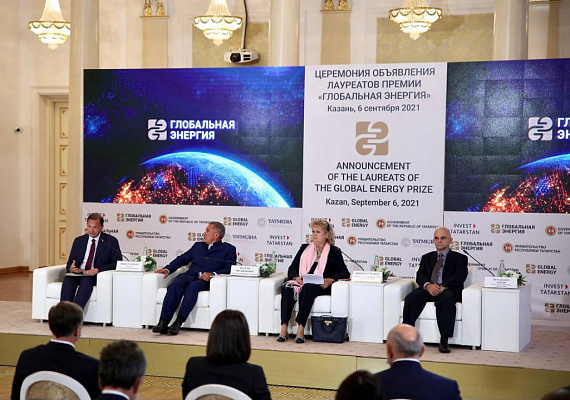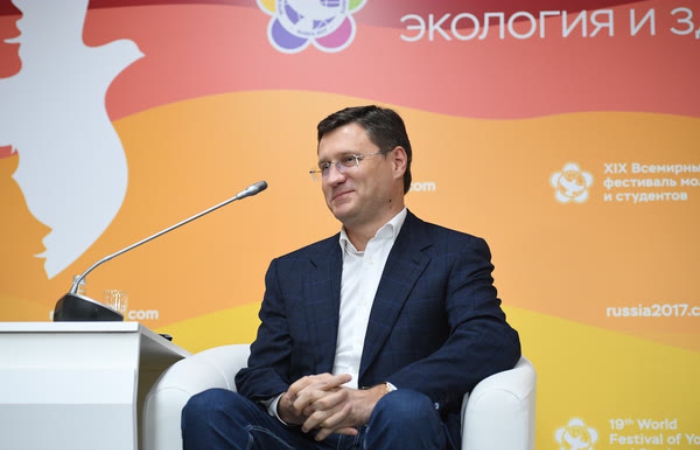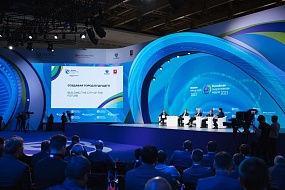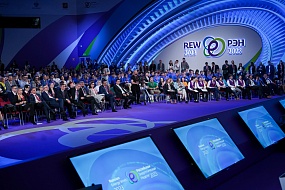September 13, 2021

On the Heels of EEF and the Run-up to REW: Kazan Hosts Global Energy Prize 2021 Awards Ceremony

A ceremony was held in Kazan to announce the winners of the Global Energy Prize 2021: Suleyman Allakhverdiyev from Russia and US representative Yi Cui. The name of the third laureate, Zinfer Ismagilov, was announced on 3 September at the plenary session of the Eastern Economic Forum, which was attended by the presidents of Russia, Kazakhstan, Mongolia, and China and the prime ministers of India and Thailand. The official award ceremony will take place during the Russian Energy Week International Forum, which will be held on 13–15 October in Moscow.
The ceremony to announce the names of the winners took place at Kazan City Hall. The event was attended by President of the Republic of Tatarstan Rustam Minnikhanov, Global Energy Association President Sergey Brilev as well as members of the International Prize Award Committee: Marta Bonifert from Hungary and Dmitry Bessarabov from South Africa.
Zinfer Ismagilov won the ‘Traditional Energy’ nomination for his fundamental contribution to the chemistry of carbon materials, heterogeneous catalysis, and the fight against climate change.
Suleyman Allakhverdiyev won the ‘Non-traditional Energy category for his outstanding contribution to the development of alternative energy, scientific achievements in the design of artificial photosynthesis systems, and a series of scientific works concerning bioenergy and hydrogen energy.
Yi Cui was nominated in the ‘New Ways to Generate Energy’ category for his exceptional contributions to the development, synthesis, and characterization of nanomaterials for energy and the environment, particularly transformational innovation in battery science.
“Having selected these three candidates, I am certain that Global Energy has given a clear signal that scientific and technological innovations in both traditional and non-traditional energy can lead to the clean energy of the future,” Chairman of the of the Global Energy Prize International Award Committee and Nobel prize laureate Rae Kwon Chung. “I would like to acknowledge the tremendous work done by the team of the Global Energy Association headed by Sergey Brilev to increase the number of participating countries, which made it possible to attract more than a hundred new candidates.”
The Global Energy Prize winners were recently identified at a closed meeting of the International Committee. To determine the winner in certain categories, the Committee held six rounds of voting, an indication of how intense the competition was among the candidates. The high level of competition is the result of efforts to internationalize the Global Energy Prize, which the Association has undertaken over the past year and a half. In this context, the victory by the two Russian nominees looks particularly significant and reaffirms that Russia retains leading positions in the development of exact sciences.
The meeting of the International Committee was the final stage of the annual nomination cycle. Applications started being received in March 2021. The campaign set a record both in terms of the number of unique nominations (94 versus 78 in 2020 and 39 in 2019) and the number of participating countries (36 versus 20 in 2020 and 12 in 2019). Each of the applications was reviewed by independent experts who assessed them based on a fixed set of criteria, including scientific novelty and practical value.
The next nomination cycle for the award will begin on 1 December 2021.
Short biographies of the laureates:
Zinfer Ismagilov (Russia)
Director of the Institute of Coal Chemistry and Chemical Materials Science of the Federal Research Centre for Coal and Coal Chemistry SB RAS.
In 1969, he graduated from Novosibirsk State University with a degree in chemistry and entered the postgraduate course of the Institute of Catalysis of the Siberian Branch of the USSR Academy of Sciences. In 1973, he defended his Ph.D. thesis. In 1988, he defended his doctoral dissertation in chemical sciences. In 1991, he was awarded the title of professor. His main areas of research are coal chemistry, chemistry of carbon materials, and heterogeneous catalysis.
In 1993, he was educated as part of the special programme of the US Department of Commerce (SABIT) on the organization and management of science and production. In 2006, he received an education in the commercialization of scientific results at the University of Arizona and Livermore National Laboratory.
He is in charge of numerous international projects: 9 International Science and Technology Centre projects, 7 projects of the Netherlands Organization for Scientific Research (NOW), 6 projects of the European Union, and 3 projects of Japan’s New Energy and Industrial Technology Development Organization (NEDO). He is a participant in and coordinator of more than 15 integration projects of the Siberian branch of the Russian Academy of Sciences with the academies of sciences of CIS countries. He has taken part in all International Catalysis Congresses since 1980 (Tokyo), European Catalysis Congresses, and conferences of the European Materials Research Society (EMRS) and the International Union of Materials Research Societies (IUMRS).
He has been an academician at the Russian Academy of Sciences since 15 November 2019 in the Department of Chemistry and Materials Science at the Siberian Branch of the Russian Academy of Sciences (coal chemistry).
Suleyman Allakhverdiyev (Russia)
Head of the Laboratory of Controlled Photobiosynthesis at the Institute of Plant Physiology of the Russian Academy of Sciences (Moscow) and Chief Researcher at the Institute of Fundamental Problems of Biology of the Russian Academy of Sciences (Pushchino, Moscow Region). In 1973, he graduated from the Physics Department of Azerbaijan State University. In 1984, he defended his Ph.D. thesis on ‘Biophysics’ at the Institute of Biophysics of the USSR Academy of Sciences. In 2002, he defended his doctoral dissertation on ‘Physiology and Biochemistry of Plants’ at the Institute of Plant Physiology of the Russian Academy of Sciences. He is the author of 7 inventions and more than 350 publications. He has worked as a visiting professor in 15 countries around the world, including Australia, Germany, and the Netherlands.
Allakhverdiyev validated the energy and kinetic patterns of electron transfer during photosynthesis. He proved that in photosynthesis, water is oxidized and oxygen is released with the involvement of four manganese atoms, thereby making a valuable contribution to the world of biological science. The results of his research are included in all textbooks concerning photosynthesis. In the past 25 years, Allakhverdiyev has been developing a new discipline and researching artificial photosynthesis systems in order to obtain molecular hydrogen as an alternative source of energy.
Yi Cui (USA)
Director of the Precourt Institute for Energy, Co-director of the StorageX Initiative, and a Professor of Materials Science and Engineering. A clean-tech pioneer and entrepreneur, Cui earned a bachelor’s degree in chemistry in 1998 from the China University of Science and Technology and a doctorate in chemistry from Harvard University in 2002. Prior to joining Stanford, from 2002 to 2005, he was a research fellow at the Miller Institute for Basic Research at the University of California, Berkeley. Cui runs a large research group at Stanford University, which has provided the world with numerous successful scientists and businessmen. In an effort to release the energy and environmental technologies his laboratory has developed to the market, he founded five companies: Amprius, 4C Air, EEnotech, EnerVenue, and LifeLab Design Inc.
An eminent researcher in nanotechnologies that have been used to create better batteries and other environmentally friendly technologies, Cui has published over 500 studies. In 2021, the US Department of Energy awarded him the Ernest Lawrence Prize for scientists and mid-level engineers in eight research areas. Cui has also been awarded the Materials Research Society Medal (2020), the Electrochemical Society’s Battery Division Technology Award (2019), Nano Today Award (2019), Blavatnik Award (2017), and Sloan Fellowship (2010).





